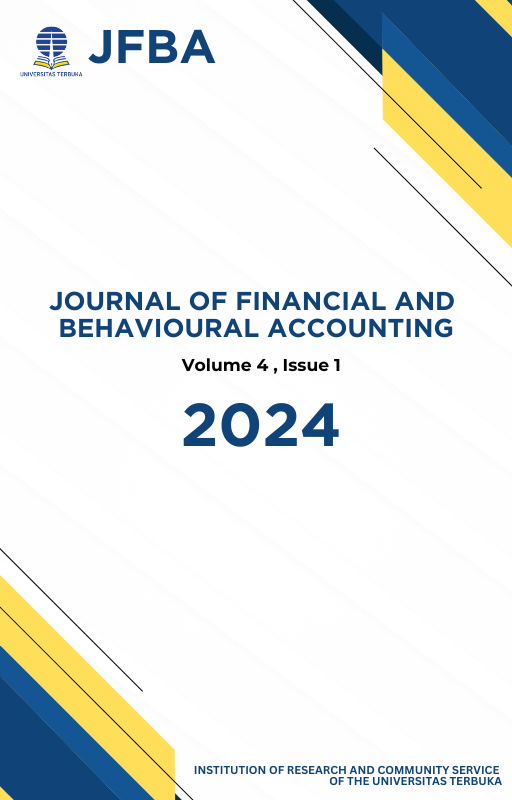Determinants of Financial Inclusion and Financial Well-Being of MSMEs Entrepreneurs in Lamandau Regency
DOI:
https://doi.org/10.33830/jfba.v4i1.9780.2024Keywords:
Financial Inclusion, Financial Literacy, Financial Well-being, MSMEsAbstract
Micro, Small, and Medium Enterprises (MSMEs) are an important sector in the Indonesian economy, contributing greatly to job creation and economic growth. Financial inclusion and financial well-being of MSMEs entrepreneurs are important factors in improving the performance and competitiveness of MSMEs. The objective of this study is to examine the factors that influence financial inclusion and financial well-being. There are four independent variables tested, namely financial literacy, accessibility, affordability, and use. This study was conducted in Lamandau Regency, Central Kalimantan Province, Indonesia. The sample of this study was MSMEs entrepreneurs in Lamandau Regency, Central Kalimantan Province. Data were collected through questionnaires and processed using the smart-PLS application. The questionnaire was distributed to the MSMEs communication forum in the form of an e-form. The results of this study indicate that the factors that influence financial inclusion and financial well-being are financial literacy. The conclusion of this study is that financial literacy is a determining factor in financial inclusion and ultimately affects financial well-being. These results provide recommendations for the government to play an active role in providing financial education to the public, especially MSMEs entrepreneurs
References
Anwar, M. (2022). Green economy sebagai strategi dalam menangani masalah ekonomi dan multilateral. Jurnal Pajak Dan Keuangan Negara (PKN), 4(1S), 343-356.
Bhatia, S., & Singh, S. (2019). Empowering women through financial inclusion: a study of urban slum. Vikalpa, 44(4), 182-197.
Cámara, N., & Research, B. (2019). Measuring financial inclusion: A multidimensional index.
ISI world statistics congress on “financial inclusion.”
Cámara, N., Research, B., &Tuesta, D. (2019). Measuring financial inclusion: a multidimensional index. Bank for International Settlements, September. https://www.bis.org/ifc/publ/ifcb47p.pdf
Chandrarin, G., Sanusi, A., Imron, A., &Yuniarti, S. (2019b). Studi empiris tentang kesetaraan pendapatan, pertumbuhan ekonomi dan inklusi keuangan di Indonesia: pengembangan model pembiayaan UKM. International Journal of Education. Economics and Development, 9*(4), 346– 365. https://www.inderscienceonline.com/doi/abs/10.1504/IJEED.2019.096056
Grohmann, A., Klühs, T., & Menkhoff, L. (2019). Does financial literacy improve financial inclusion? Cross country evidence. World Development, 111, 84-96.
Hanivan, H., & Nasrudin, N. (2019). Indeks inklusi keuangan untuk Indonesia. Buletin Ekonomi Moneter dan Perbankan, 22(3), 351–366. https://doi.org/10.21098/bemp.v22i3.1056.
Herdinata, C., & Pranatasari, F. D. (2019). Panduan penerapan financial technology melalui regulasi, kolaborasi, dan literasi keuangan pada umkm.
Kalpana, K. (2020). Economic entitlements via entrepreneurial conduct? Women and financial inclusion in neoliberal india. Journal of World-Systems Research, 21(1), 50–68.
Kementerian Koordinator Bidang Perekonomian Republik Indonesia. 2020. Pemerintah terbitkan perpres nomor 114 tahun 2020 untuk percepat inklusi keuangan indonesia. Jakarta: Kementerian Koordinator Bidang Perekonomian Republik Indonesia.
Kementerian Keuangan. (2021). Keuangan inklusif. Jakarta: Kementerian Keuangan.
Kumari, T. (2021). Dimensions of financial inclusion: An individual perspective. Journal of Accountancy & Finance, 66(2), 41–60.
Le, T. H., Chuc, A. T., &Taghizadeh- Hesary, F. (2019). Financial inclusion and its impact on financial efficiency and sustainability: Empirical evidence from Asia. Borsa Istanbul Review, 19(4), 310– 322. https://doi.org/10.1016/j.bir.2019.07.002
Limanseto, H. (2021). Dukungan pemerintah bagi umkm agar pulih di masa pandemi. Kementerian koordinator bidang perekonomian republik indonesia. https://www.ekon.go.id/publikasi/detail/293 9/dukungan-pemerintah-bagi-umkm- agar- pulih-di-masa-pandemi
Littlefield, B. Y. E., Morduch, J., &Hashemi, S. (2023). Is microfinance an effective strategy to reach the Millennium Development Goals. Focus note, 24(2023), 1-11.
Otoritas Jasa Keuangan. (2022). Survei nasional literasi dan inklusi keuangan 2022. Jakarta: Otoritas Jasa Keuangan.
Pambudianti, F. F. R., Purwanto, B., & Maulana, T. N. A. (2020). The implementation of fintech: Efficiency of MSMEs loans distribution and users’ financial inclusion index. Jurnal Keuangan Dan Perbankan, 24(1), 68-82.
Sarma, M. and Pais, J. (2019), “Financial inclusion and development: A cross country analysis”, ICRIER working paper, Indian Council for Research on International Economic Relations, New Delhi, available at: https://www.icrier.org/pdf/Mandira%20Sarma-Paper.pdf.
Soederberg, S. (2019). Debtfare states, and the poverty industry: Money, discipline and the surplus population. Abingdon: Routledge.
Sugiyono. (2023). Metode penelitian kuantitatif, kualitatif, dan R&D. Bandung: Alfabet.
Wickham, P. A. (2021). Strategic entrepreneurship. Essex, UK: Prentice Hall
Downloads
Published
How to Cite
Issue
Section
License
Copyright (c) 2024 Siti Nurlina, Diky Paramitha

This work is licensed under a Creative Commons Attribution-ShareAlike 4.0 International License.







